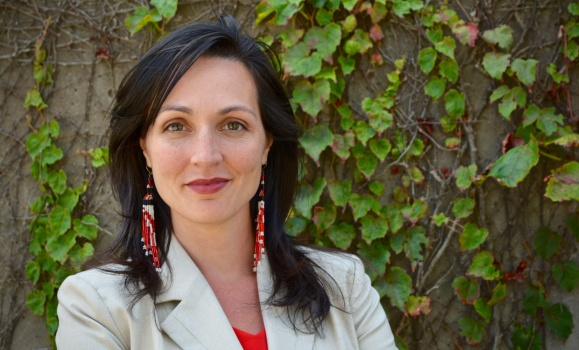News
» Go to news mainImproving the welfare of Indigenous children in Canada

Policy impact is an integral part of the fabric of the Schulich School of Law. Our work is grounded in shaping public policy through interdisciplinary, collaborative research that has a positive, real-world impact beyond the law school. Today, weÔÇÖre looking at Professor Naiomi Metallic's work to ensure the welfare of Indigenous children is protected by law.
When Bill C-92, An Act Respecting First Nations, Inuit and M├®tis Children, Youth and Families, became law in June of 2019, Professor Naiomi Metallic saw that her years of research and advocacy into improving the welfare of Indigenous children in Canada were finally crystallizing.
ÔÇ£The Bill is an important step forward in Canada,ÔÇØ says Metallic. ÔÇ£ItÔÇÖs the first time the federal government has exercised its jurisdiction to legislate in the area of Indigenous child welfare.ÔÇØ
The purpose of the Bill is threefold: to recognize Indigenous peoplesÔÇÖ jurisdiction over child and family services as part of an inherent and Aboriginal right to self-governance; to establish national standards in this area, in response to the TRCÔÇÖs Call to Action No. 4; and to contribute to the implementation of the United Nations Declaration on the Rights of Indigenous Peoples.
From scholarship to the Senate
Metallic is a co-author of two recent Yellowhead Institute special reports: ÔÇ£An Act Respecting First Nations, M├®tis and Inuit Children, Youth and Families: Does Bill C-92 Make the Grade?ÔÇØ and ÔÇ£Promises and Pitfalls of Bill C-92.ÔÇØ The Yellowhead Institute, a First Nation-led research centre based at Ryerson University, generates critical policy perspectives in support of First Nation jurisdiction.
In the spring of 2019, Metallic and Hadley Friedland, a leading Indigenous law scholar at the University of Alberta, delivered submissions to the House of Commons and the Senate to raise concerns about Bill C-92, which was before Parliament at the time, and to ask lawmakers to make amendments to it.
We have the responsibility to think about the problems facing Indigenous groups in Canada in innovative ways and to convey our ideas in ways that are accessible to the communities they are intended to serve."
Suggestions that were taken up by Parliament include some clearer language around funding obligations and a redefinition of the phrase ÔÇ£best interestsÔÇØ of a child that is better aligned with Indigenous culture. ÔÇ£Some of our suggestions were incorporated, but not all of them, so thereÔÇÖs more work to be done,ÔÇØ says Metallic.
Over the years, Metallic has approached her research from multiple anglesÔÇöfrom constitutional to administrative law, international law to equality law and human rights codes, to┬áIndian Act Band Council bylaw powers.
ÔÇ£As legal practitioners and scholars who are concerned about the situation of Indigenous peoples in this country,ÔÇØ says Metallic, ÔÇ£we have the responsibility to think about the problems facing Indigenous groups in Canada in innovative ways and to convey our ideas in ways that are accessible to the communities they are intended to serve.ÔÇØ
Recent News
- Professor Camille Cameron ft in "Can Big Oil be made to pay like Big Tobacco?"
- DLAS Community Legal Worker Mark Culligan ft in "91 residents of N.S. mobile home park file for return of 'unlawful' water charges"
- Professor Emeritus Wayne MacKay ft in "'DogÔÇæsitter films explicit OnlyFans content in client homes, raising privacy concerns"
- Professor Elaine Craig ft in "Sexual Integrity, Pornography and Law with Dr. Elaine Craig (part 2)"
- The Schulich School of Law Welcomes Lisson ExpertsÔÇæinÔÇæResidence
- Alumni Couple Creates Bursary to Benefit Law Students
- Associate Professor Anthony Rosborough ft in "Senate gives final approval to two copyright bills"
- Professor Elaine Craig ft in "N.S. legal scholarÔÇÖs book describes ÔÇÿmainstreamÔÇÖ pornÔÇÖs rise, and the price women pay"
